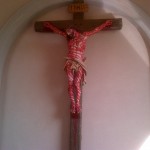Good prep reading from Fr. Raymond de Souza:
I am drawn to the simple, solemn and silent moments of Holy Week. There are two great silences on Good Friday. The first at the beginning of the liturgy, when the priest prostrates himself before the altar; the second during the reading of the Gospel, when the entire congregation kneels after St. John tells us that “He bowed His head and gave up His spirit.” I prefer to extend those moments until well after the congregation’s shuffling has ceased, and everyone, kneeling in silent contemplation, feels the weight of the mystery too great for words.
Holy Week is so rich in special symbols we can miss that the liturgy is slowly stripping itself bare. The washing of the feet, the veneration of the cross, the lighting of the candles, all this can distract us from the liturgy making itself ever more spare, ever more stark.
We begin the process on Ash Wednesday. We cease the Alleluia and suspend the Gloria. The flowers are gone from the sanctuary. The organ is reserved to accompaniment only — no voluntaries. As Holy Week draws near, statues and images are veiled. On Holy Thursday the organ falls silent entirely. The altar is literally stripped bare at the end of Mass. Most dramatically the Blessed Sacrament is removed from the tabernacle and taken to an altar of repose. The bare altar, the empty tabernacle, the extinguished sanctuary lamp — it is striking on Good Friday to enter a church that is achingly empty. Finally, the liturgy withholds two more things from us — sound and light. Good Friday begins and ends in silence. The Easter Vigil begins in darkness.
The great silences of Good Friday are profound moments for the priest. The prostration calls to mind his ordination and the bond between the great High Priest on the Cross and the priesthood He shares with those in Holy Orders. The kneeling during the reading of the Passion is also striking, for the priest is not accustomed to liturgical kneeling — at Mass, he never kneels, only genuflects.
The silence makes the deepest impression. At those moments all of the busyness, the preparation of the homilies, the choreography of the liturgy, the arranging of the church, the blessing of the palms and the preparation of the towels, the crucifix, the altar of repose, and the new fire — all can be laid aside when prostate before the altar or kneeling at it. There is nothing to be said, nothing to be done. It remains only to be silent before the news that silenced even the heavenly choirs of angels: God has died on the Cross.
There was much commotion at the foot of the cross — the weeping of the Blessed Mother, the taunting of the priests and scribes, the jeering of the soldiers — but on the cross, save for those seven painful occasions, Jesus is silent. Silent, for the pain of crucifixion makes it difficult to speak. And we remain silent, for the pain of seeing our Lord crucified — and for our sins! — stills our voice too.











